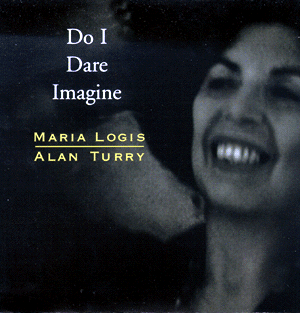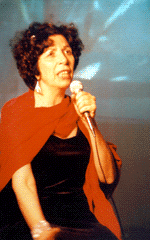To purchase a copy please email Maria!
SingMyWay[at]earthlink[dot]net

Copyright 1997 & 2000
Songs
- to hear a sample, click on the desired song
2.
Magnificat
3.
Woman, why are you Weeping?
6.
I Want to Swim with the Dolphins
9.
The Train
Liner Notes
I
first met Maria Logis in a writing workshop I was teaching. She came into
class with an autobiographical manuscript of quite remarkable depth, a
life-or-death tale in which the surrender to faith is made through music
that restores both body and soul. The narrative prose of the early draft
was a bit rough, but I could not help noticing the powerful poetics of
her lyric passages drawn from music therapy sessions with Alan Turry.
In song after song, Maria used simple, intimate language and deft repetition
of key phrases to chart a terrifying and enlightening journey into the
body and its history of suffering and redemption. Early in our work I
noted that these passages were the core of her story, that they represented
the creative intuition of her artistic identity. The songs on this CD
would be a stunning achievement for any artist; that they would arise
in the imagination of a middle-aged human resources manager with almost
no musical training or creative experience is quite miraculous.

This is soul
music of the highest order. Even in the precise and sensitive arrangements
for keyboard and strings, the improvisational genesis informs both songs
and singing. Maria has a natural ease with blue notes and jazzy phrasing.
Her alto quavers, floats, moans and testifies, sometimes all within the
same song. She is a lover of gospel who draws on the music of the Orthodox
Church and the folk music from the mountains of Greece. Her strongest
affinity, however, is with jazz and opera. The songs are acts of witness
to the ordeal of living. Many are lamentations, blue in spirit if not
form. All of them express a transformation of the soul, from passive victim
to creative artist, and of the body from sickness to health. Her discovery
of her true voice is recounted in these songs, and their real power is
not that they portray a personal confession but that they enact a fundamental
spiritual process. In order to be whole, each of us must find our true
voice, whether we are singers, poets, accountants, or bus drivers. By
so boldly stepping forth in an act of faith, Maria not only changes herself
but is the agent of change in her audience. She has chosen to face death
singing—her peculiar duende, the
flamenco singer's fierce devotion to life in spite of loss—and by doing
so transcends the fear that silences too many of us daily.
Though this
music is beautiful, it is sometimes not "pretty." It is often
about sadness and pain, but it is not self-pitying. It expresses doubt,
yet finds faith. Maria's lyrics are simple and direct, but their meanings
are as deep as the oceans in which her dolphins swim. If you listen closely,
with an open heart, you might just find yourself swimming with those dolphins,
as she did.
Gary Keenan
Poet and Writer
New York City, March 2002